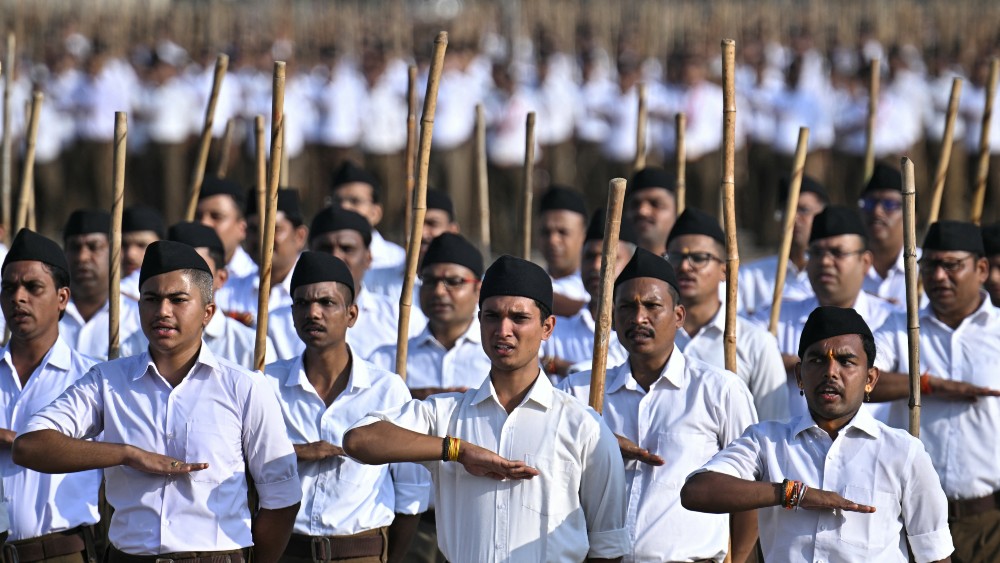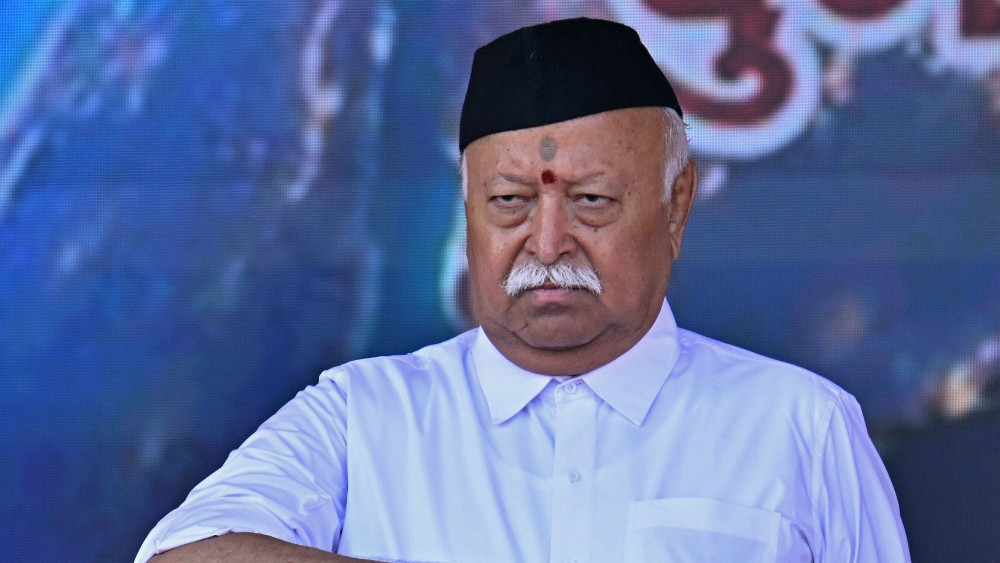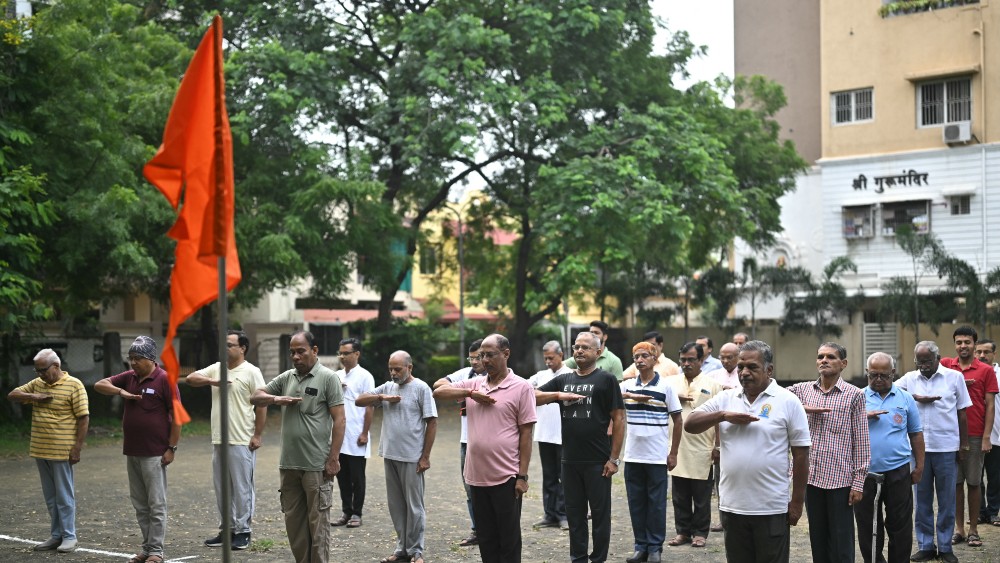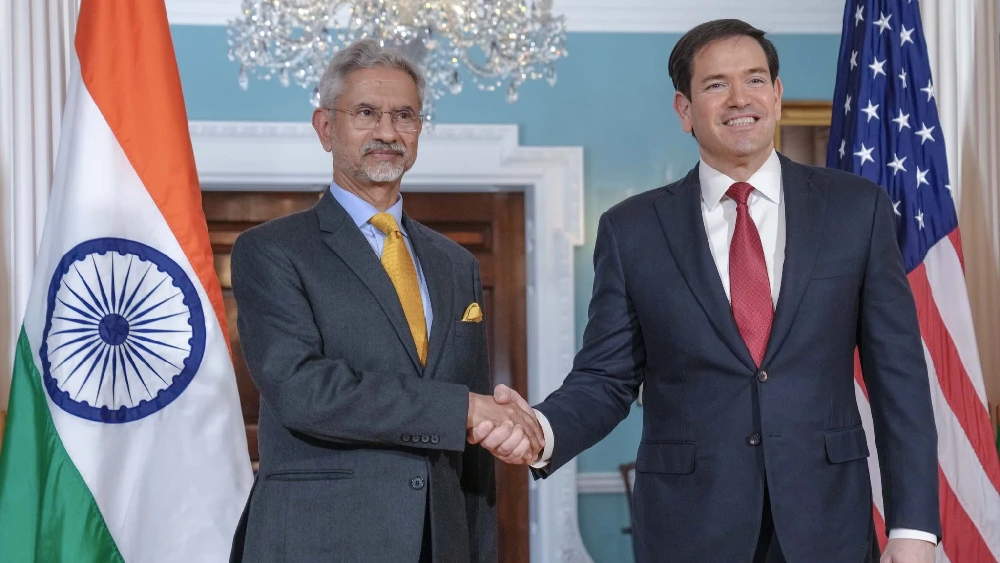
NAGPUR: Rashtriya Swayamsevak Sangh (RSS) volunteers take part in the Hindu nationalist organization's centenary celebrations at Reshimbagh Ground in Nagpur on October 2, 2025. -- Photo by AFP/File
NAGPUR: Brandishing bamboo sticks and chanting patriotic hymns, thousands of uniformed men paraded in central India, a striking show of strength by the country's million-strong Hindu ultranationalist group.
The Rashtriya Swayamsevak Sangh -- the National Volunteer Organisation, or RSS -- marked its 100th anniversary this month with a grand ceremony at its headquarters in Nagpur.
AFP was one of a handful of foreign media outlets granted rare access to the group, which forms the ideological and organizational backbone of Prime Minister Narendra Modi's Bharatiya Janata Party (BJP), in power since 2014.
Undermining constitution
Critics accuse the 75-year-old prime minister and the RSS of eroding the rights of India's Muslim minority and undermining the secular constitution.
At the parade, RSS volunteers in white shirts, brown trousers, and black hats marched, boxed, and stretched in time to shrill whistles and barked orders.
"Forever I bow to thee, loving Motherland! Motherland of us Hindus!" they sang, in a scene that evoked paramilitary drills of the past.
"May my life ... be laid down in thy cause!"
Hindus make up around 80% of India's 1.4 billion people.
Founded in 1925, the RSS calls itself "the world's largest organization," though it does not give membership figures.
‘Hindutva’
At the heart of its vision is "Hindutva" -- the belief that Hindus represent not only a religious group but are India's true national identity.

"They are willing to fight against those who will come in their way ... that means minorities, Muslims, Sikhs, Christians, and other Hindus who do not subscribe to the idea," historian Mridula Mukherjee said.
RSS chief Mohan Bhagwat uses softer language, claiming that minorities were accepted but that they "should not cause division."
‘Fascist by nature’
The RSS was formed during the imperial rule of the British.
But it diverged sharply from that of independence efforts by Mahatma Gandhi and the Congress Party, whose leader Jawaharlal Nehru considered them "fascist by nature."
Mukherjee said archives showed "a link between the RSS and fascist movements in Europe."
Idealizing Nazis
"They have said, very clearly, that the way the Nazis were treating the Jews should be the way our own minorities should be treated," she told AFP.
The RSS does not comment directly on such parallels, but Bhagwat claimed that "today we are more acceptable."
The RSS was an armed Hindu militia during the 1947 partition of India and the creation of Muslim-majority Pakistan.
Gandhi’s assassination
Hindu extremists blamed Gandhi for “breaking India apart.”
A former RSS member assassinated him in 1948, and the group was banned for nearly two years.
But the RSS rebuilt quietly, focusing on local units known as "shakhas" to recruit.
Today, it claims 83,000 of them nationwide, as well as over 50,000 schools and 120,000 social welfare projects.
Saffron flag not India’s tricolor
At a shakha in Nagpur, Alhad Sadachar, 49, said the unit was "meant to develop togetherness."

"You can get a lot of good energy, a lot of good values, like helping those in need," he said.
At a shaka that AFP was allowed to attend, dozens of members –- many middle-aged, elderly, and not in uniform –- gathered for an hour of calisthenics and song.
But in a show of symbolism, they congregated beneath a saffron flag -- the color of Hinduism -- rather than India's tricolor.
Demolition of Mughal-era Babri mosque
The RSS remains deeply political.
The group re-emerged in the late 1980s, spearheading a movement that ended with a violent mob demolishing the centuries-old Mughal-era Babri Mosque in Ayodhya -– now replaced by a gleaming temple to the Hindu god Rama.
Role in BJP’s victory
"That was the turning point," said Mukherjee, the historian, adding that the RSS was "able to create a mass mobilization on religious issues, that became at its heart clearly anti-Muslim."
The group helped deliver Modi's BJP party an electoral landslide in 2014.
Since then, Modi -– a former RSS "pracharak", or organizer -- has pursued policies that critics say marginalize India's estimated 220 million Muslims, 15% of the population.
Lynching and hate speech
"There has been a clear increase in terms of violence, lynching, and hate speech since Modi has taken over," said Raqib Hameed Naik, director of the US-based Center for the Study of Organized Hate.
RSS leaders deny that it has participated in atrocities.
"Those allegations are baseless," Bhagwat claimed.
"Atrocities were never done by the RSS. And if it happens anyway, I condemn that."
RSS under Modi
Under Modi, it has expanded its reach.
"The RSS has been able to stir Indian society in a direction that is more nationalistic, less liberal in a Western sense," said Swapan Dasgupta, a former nationalist parliamentarian.
Related Articles
Latest News
Jaishankar, Rubio discuss critical minerals, strategic partnership in Washington
24 MINUTES AGO

Russia resumes large-scale Ukraine strikes in freezing weather
4 HOURS AGO
.jpg)
Balochistan attacks: UNSC condemns ‘heinous, cowardly’ terrorists
5 HOURS AGO
.jpg)
Son of Libya's late ruler Kadhafi killed by armed gang
7 HOURS AGO
Erdogan, Saudi Crown Prince review prospects for improving bilateral ties
8 HOURS AGO
.jpg)

.jpg)